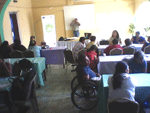Nicaragua
Published on Mon, 2019-02-18 11:55
In Nicaragua, the joint report of Coordinadora Civil and the National Platform in Defense of Water and Life, argues that access to water is both a human right and one of the Sustainable Development Goals”. Nicaragua is suffering a shortage of safe water as a result of the combined effect of climate change that reduces superficial water and the unregulated extraction of underground water by industrial agro-exporters and enclave tourism. |
|
El cumplimiento de los ODM en Nicaragua está en inminente peligro debido a las serias dificultades que enfrenta en virtud de varios factores, como el escaso crecimiento económico, el aumento de la población que demanda alimentos y trabajo, y la creciente corrupción. Aunque hay avances en algunos de ellos, no son suficientes y no se acercan a la meta. El modelo agroexportador, que hasta hoy solo ha generado empleos precarios e informales que condenan a vivir bajo el umbral de la pobreza a las personas que los desempeñan, y un sistema tributario regresivo le están cerrando al país la posibilidad de aprovechar la oportunidad histórica de la transición democrática.
|
|
Source: . Published on Tue, 2013-02-12 16:17
» |
Published on Thu, 2013-02-07 18:54
The achievement of the MDGs in Nicaragua is in imminent danger due to the serious difficulties faced by virtue of several factors, such as low economic growth, increasing population demanding food and work, and growing corruption. Although there has been progress in some of them, this is not enough and does not approach the goal. |
|
The country will not be able to adopt a sustainable development model unless it can overcome its current lack of resources. The country has serious environmental problems including over-exploitation of the soil, the nearexhaustion of fishing resources, increasing deforestation due to indiscriminate tree cutting and unsustainable practices in agriculture, and overdependence on coffee as a cash crop, which depletes soil fertility and pollutes water resources. Yet the State’s coffers are empty. The way forward is to completely reform the taxation system to make it fairer, and to invest the extra funds in education and in promoting methods of production that cause less damage to the environment.
|
|
Source: . Published on Thu, 2011-03-03 07:40
Por Rafael Lara | Nacionales |
|
Source: . Published on Mon, 2010-11-08 23:00
» |
|
Adolfo Acevedo
The Government is not taking advantage of the so-called “demographic bonus,” which offers a historic development opportunity in the next 20 years. Since the share of the population that is under 18 years is falling each year, now is the time to invest in educating the new generation so that it can increase per capita income levels. Development planning should prioritize public education and allocate at least 7% of Gross Domestic Product (GDP) to this sector over the next 10 years in order to achieve basic education goals. If Nicaragua does not invest in education now it will be too late.
|
|
In Nicaragua, the fall in income from exports and remittances is already beginning to make itself felt and is having a tangible effect in terms of higher unemployment and increased poverty. In the short term, to limit the impact of the crisis, the government should increase public sector expenditure and thus stimulate economic activity and employment, even though these measures alone do not attack the country’s main problems. A major change of direction and a complete overhaul of the current growth model are urgently needed. Agriculture is very backward and must be revived, and a major effort to recapitalise the country’s human capital is essential.
|
SUSCRIBE TO OUR NEWSLETTER







